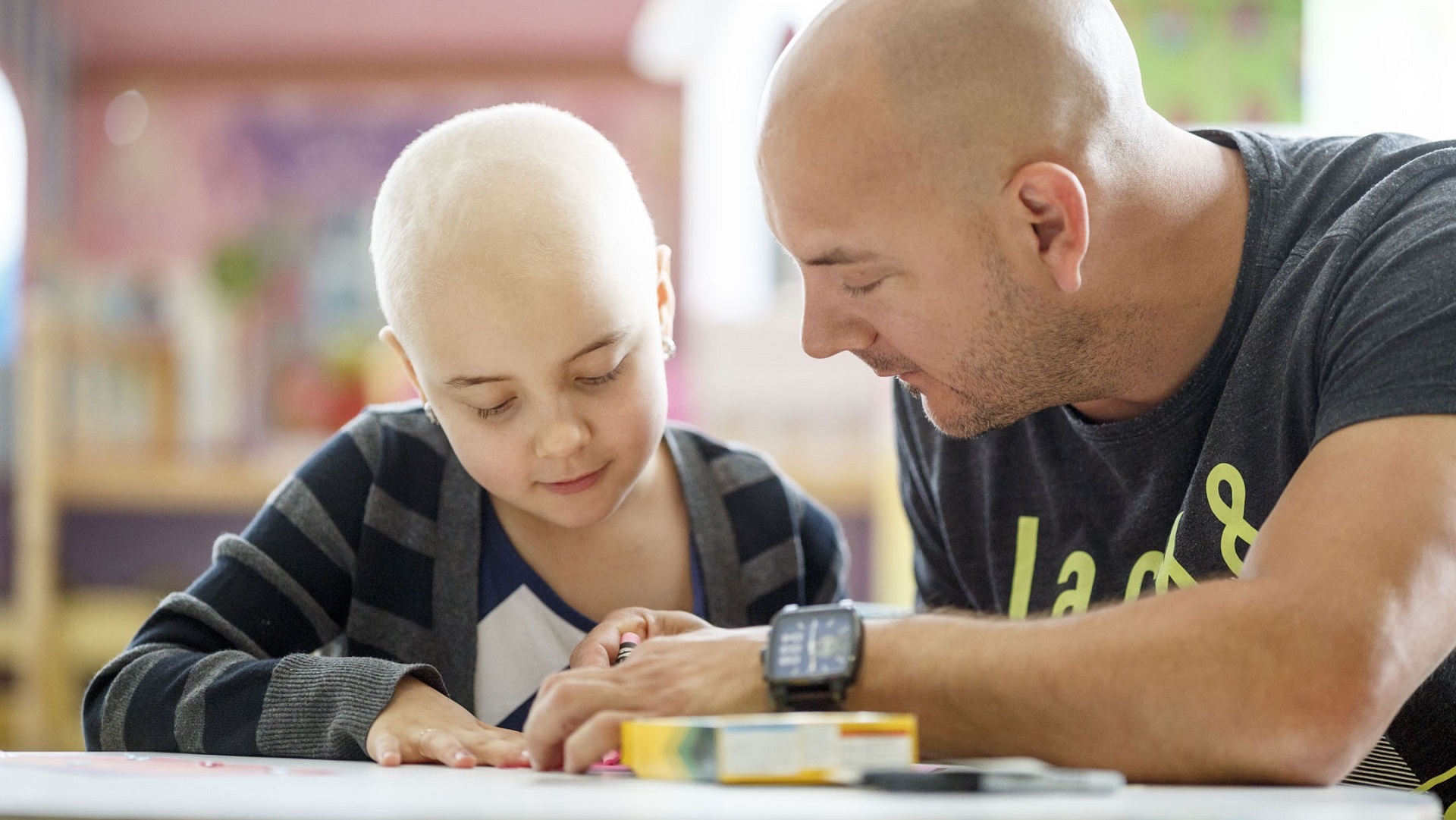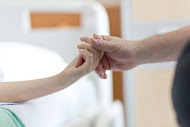Questions from Children
You can’t catch cancer. We don’t really know what causes it. There are many factors involved and it’s never the child’s fault. It happens when the body can no longer defend itself. Many people—researchers, doctors and specialists—are working very hard on finding medicine to treat and cure cancer.
Did you know that the human body is made up of billions of tiny cells bind together to form the organs and systems? But one day, one of these tiny cells decides to rebel. It stops doing what normal cells are supposed to do. It becomes abnormal. Then, it starts to make many other rebellious cells. All these cells are sick. They are not following the rules of the body and they destroy everything around them. These are called “cancer cells.”
We know because we feel a lot of pain, we start looking very pale for a long time or we get bruises that don’t heal. If you have a little bruise or a little bit of pain, don’t worry. This happens to everyone from time to time and it doesn’t mean you have cancer.
To cure cancer, doctors use all the treatments they know. One of these treatments is surgery. This means doing an operation to remove the group of cells that are sick (tumour). Surgery is like pulling weeds from a garden.
Sometimes doctors decide that it’s best to treat a child’s cancer with radiation therapy, with X-rays. An X-ray is like invisible rain that destroys the weeds, but it doesn’t hurt.
Another way to treat cancer is with chemotherapy. Chemotherapy destroys the sick cells using medicine. You can take it as a pill or as an injection with a needle.
Yes, it’s what’s known as a relapse. If this happens, doctors repeat the treatment (chemotherapy, radiation therapy) more intensively. Doctors sometimes recommend a bone marrow transplant. Then, you need to stay in your hospital room for many weeks, without leaving.
The needles and the treatments are the hardest parts. You don’t get to sleep in your own bed and your parents aren’t always there. Sometimes, you miss your friends, your brothers and sisters or your cat…
Yes and no. Many children go back to their normal activities; they can run, jump and play as before. Unfortunately, sometimes physical or psychological changes will be a problem. Luckily, doctors often have solutions to these problems.
No, it doesn’t hurt. Yes, hair usually grows back.
Cancer is a serious disease. If it is not treated or if the treatments don’t work, a person can die. But in most cases, people survive.
Questions from Teens
It depends. For some people, it can take two or three weeks after the end of treatment. Sometimes, hair will look a bit different —different texture or colour, softer and so on—but it will grow back.
It takes as much energy to be bored as it does to find something to do, so why not use that energy to do something fun? Try to meet other teens who are in the same situation as you. They are going through the same thing and you’ll probably find you have many things in common. Another way to fight boredom is to have a friend, brother or sister with you. Playing cards or a board game, even doing homework can make the day go by faster. You can also keep a journal. It’s a great way to express your emotions, ideas and even jot down questions you forgot to ask your doctor.
It depends. Crowds and intimate activities are not recommended if your white blood count is low, since this can lead to a higher risk for infections. Plus, it might not be super fun when you feel tired or nauseous. But remember that you can always ask your doctor or nurse for advice.
Note : The information from this section was drawn from the Website of the Memorial Sloan-Kettering Cancer Center in New York – traduction libre.
Questions from Parents
We still don’t know the cause of childhood cancer. We do know, however, that it involves the uncontrolled multiplication of abnormal cells. These cells can spread throughout the body. They prevent the body from working properly. We are still trying to find the cause of the cellular mutation. Cancer does not discriminate. It strikes children of all ages, cultures, socio-economic backgrounds and countries.
In most types of pediatric cancer, heredity is not involved. Some types of cancer can be passed down from one generation to another in the same family, but this is relatively rare. With the exception of such cases, cancer rarely develops in other children of the same family.
Parents often feel guilty for mistaking early symptoms that are not unusual, such as low-grade fever, irritability, loss of appetite and fatigue, for minor ailments. They sometimes feel responsible for waiting too long before bringing their child to see the doctor. The symptoms mentioned above rarely indicate cancer in children. Very often, during the initial visit, doctors themselves won’t suspect that the symptoms are pointing to a serious disease like cancer.
It all depends on the diagnosis and treatment recommended by the care team. You will need to discuss it with your child’s doctor. Some children, for example, will have a treatment protocol that lasts two years and can return to school during the treatment period. Children receiving other types of treatments may need to continue their schooling at the hospital or at home. A child who is feeling well and whose condition is stable will like returning to normal activities, including school, sports and travel. Parents should try to make the child’s life as normal as possible. The same goes for returning to school after treatments.
Remember that Leucan offers a School Awareness Program to help children when they return to school. Ask about this program!
Most hair loss in children is a side effect of chemotherapy or radiation therapy. We have no way of knowing how much hair will fall out or how much will stay. To prepare your child for the experience, be sure to discuss the issue before the start of treatments. Then, if hair loss does occur, your child won’t be caught off guard. Hair normally starts to fall out in the second or third week of treatment (e.g., treatment with vincristine or cytoxan cyclophosphamide).
Hair loss can also occur as a result of radiation therapy. Once the hair loss begins, it normally lasts two to three days. Finding hair on your child’s clothing or bedding is the first sign. In general, hair strands fall out evenly. Sometimes, however, hair can come out in small clumps. It can take a few months for hair to grow back or it can even start growing back while the child is still undergoing chemotherapy.
Children need time to get used to the idea of losing their hair. It’s also recommended to have the child’s hair cut short at the start of treatment. This will make the hair loss seem less dramatic for the child and the parents. Parents can also explain that the hair will grow back and give the child a cap, hat, scarf or other headgear to wear, or give him or her the option of not wearing anything. Girls and boys can wear wigs. Leucan has a few wigs available for families who have children with cancer. Contact your local office for more information.
Before the child goes back to school, parents should let the teachers know about the hair loss. The teachers will be able to tell the class about the changes they can expect to see in their classmate. Remember that Leucan offers a School Awareness Program to help children when they return to school. Ask about this program!
You will need to be strict with your child during chemotherapy. For instance, children with a low platelet count are prohibited from taking part in any violent activities that could cause bruising or bleeding. Children with a low white blood cell count need to stay away from crowds to avoid contact with germs. Tell your child why you are being so strict so that he or she understands. Make it clear that your restrictions are temporary and that they are not a punishment in any way.
Once children develop a serious disease, many parents have a hard time setting proper limits. Keep in mind that a child’s sense of security comes from the rules and limits parents provide.
Follow the same house rules as before. Being too lenient with children can cause them to worry even more. They remember how things were before and could start to think that something is really wrong because you are treating them so differently. Following the same daily routine will keep your family grounded and ready to face the major changes that occur when a child is seriously ill. And it will make it easier for life to go back to normal once treatments end.
Your child may experience lasting physical and psychological effects. This will depend on the type of cancer your child had and the treatments used to cure it. Some children can get migraines, nausea or chronic pain. Services are now available to help young people with these symptoms. The Post-Treatment Support Program is one example. For more information about this program, contact Leucan.
Note : The information from this section was taken froM Your Child with Cancer, A Family Handbook, by the Children’s Hospital of Los Angeles.


